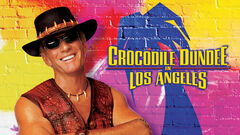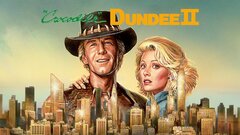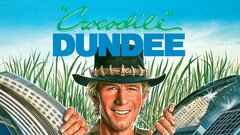If Australia has a human face in the American popular mind, it may well be the smiling, deeply lined visage of Paul Hogan. Less as an actor than a personality, this lean, tanned and weathered-looking former construction worker—nicknamed "Hoges"—represented the Land Down Under in a series of ads for the Australian Tourist Commission that enticed more than 600,000 Americans abroad. Audiences found him earnest, likeable, and down-to-earth. Hogan parlayed these qualities into international stardom as the co-writer and star of "'Crocodile' Dundee" (1986), a hugely successful comedy adventure depicting the adventures of an Outback outdoorsman in New York City.
This unpretentiously old-fashioned comedy was a smash hit that won Hogan a Golden Globe for Best Actor in a Comedy, an Oscar nomination for the original screenplay, and a BAFTA (British Academy of Film and Television Arts) Award nomination. It also generated a successful sequel, "'Crocodile' Dundee 2" (1988), which Hogan co-scripted and executive produced. Together the films grossed over $500 million.
Hogan's unlikely entertainment career began at age 31 when he wrote to a TV talent show representing himself as a rural tap-dancing knife thrower. Hogan was invited on by the producers, presumably to make a fool of himself. Instead, he won national attention with a blistering satire of that very show. This triumph led to numerous other appearances, including a regular stint as a comic commentator on "A Current Affair," a nightly magazine news show. Hogan boosted his exposure with "The Paul Hogan Show" beginning in 1977 and a series of TV specials filmed in England starting in 1983. He began proving his mettle as a TV pitchman with a series of award-winning commercials for Foster's Lager in the United Kingdom.
Prior to the release of "'Crocodile' Dundee," Hogan displayed dramatic chops in "ANZACS," a popular Australian TV miniseries set during WWI. Hogan's Hollywood career stumbled after the blockbuster success of the "Crocodile Dundee" films. The sentimental comic fantasy "Almost An Angel" (1990), in which he played a burglar slain during a heroic act and given a chance to redeem his soul, was a commercial disappointment. The genial Western comedy "Lightning Jack" (1994) also failed to register at the box-office.
Hogan took a different tack with the family picture "Flipper" (1996), sharing the spotlight with the teen-aged former child star Elijah Wood and a remarkable sea-going mammal. He was well cast as the colorful bohemian uncle to whom the youth is sent to spend the summer, but the film proved a box-office disappointment. In 2001, after nearly a dozen years, Hogan once again donned his Akubra hat and slipped comfortably into the persona of Mick Dundee for the amiable, if slightly retro, sequel "'Crocodile' Dundee in Los Angeles."
























































































































































